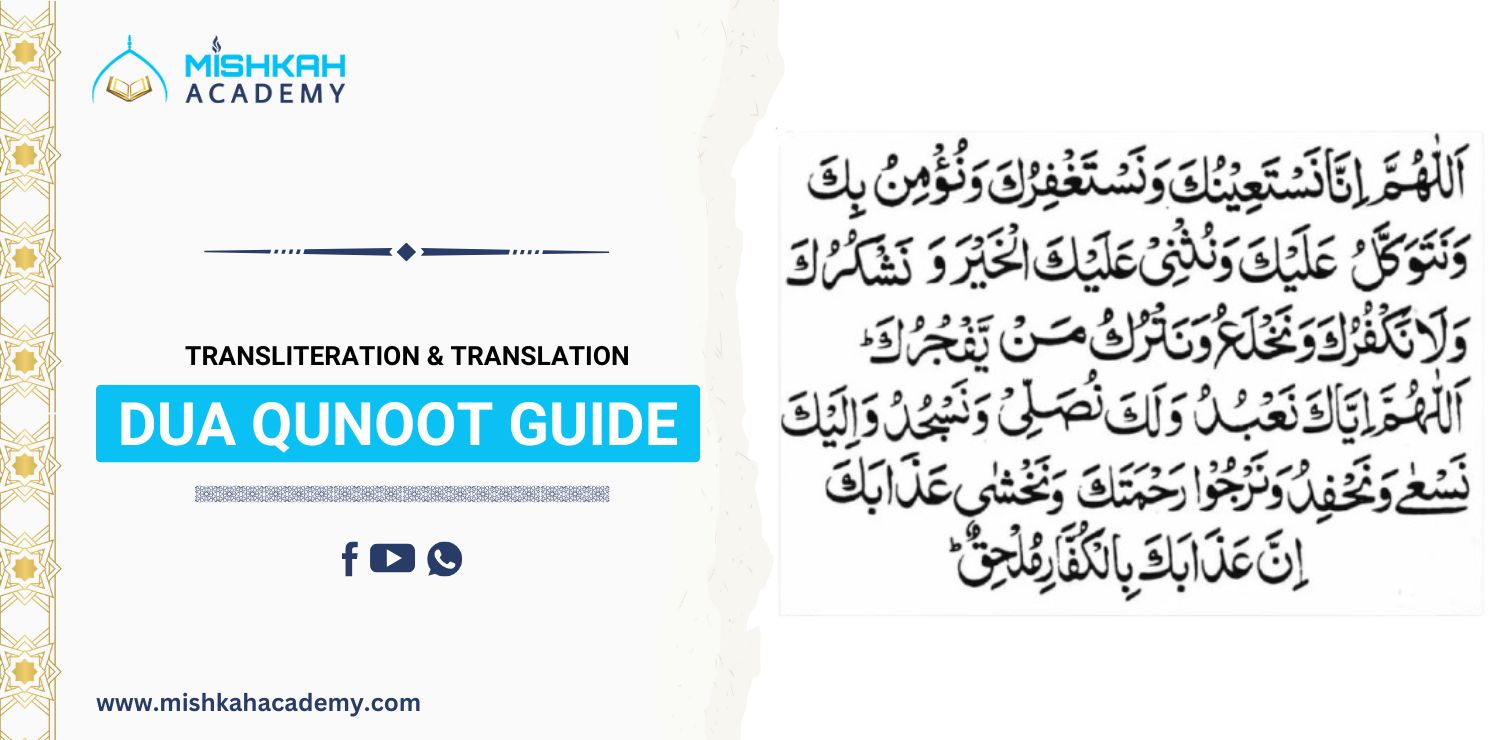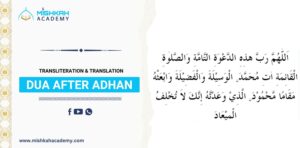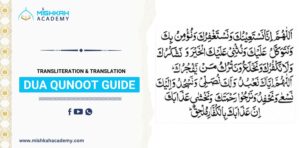Dua Qunoot is a special supplication (Dua) that Muslims read during the Isha prayer, specifically in the Witr prayer. It is often recited in the third rak’ah of Witr, just before going into ruku (bowing). This dua holds deep meaning and is a way to ask Allah for help, mercy, and protection. It is a strong part of our connection with Allah, especially during night prayers.
In this guide, you will learn what Dua Qunoot is, why it is important, and when it should be recited. The article also includes the dua in Arabic, its translation, and tips to memorize it. Additionally, we explore the benefits and significance of this beautiful supplication in your daily prayers.
What is Dua Qunoot?
Table of Contents
ToggleDua Qunoot is a special prayer that Muslims recite in the third rak’ah of the Witr prayer during the Isha prayer. The word Qunoot means humility and devotion. This supplication is a way to seek Allah’s help, ask for forgiveness, and express our worship and trust in Him. It has been taught by the Prophet Muhammad ﷺ and is commonly practiced in the Hanafi school during regular Witr prayers. It shows our complete reliance on Allah and keeps our heart connected to Him through praise and hope.
Arabic (As Eecited in Witr prayer – Hanafi)
اللَّهُمَّ إِنَّا نَسْتَعِينُكَ وَنَسْتَغْفِرُكَ وَنُؤْمِنُ بِكَ وَنَتَوَكَّلُ عَلَيْكَ وَنُثْنِي عَلَيْكَ الْخَيْرَ، وَنَشْكُرُكَ وَلَا نَكْفُرُكَ، وَنَخْلَعُ وَنَتْرُكُ مَنْ يَفْجُرُكَ، اللَّهُمَّ إِيَّاكَ نَعْبُدُ وَلَكَ نُصَلِّي وَنَسْجُدُ وَإِلَيْكَ نَسْعَى وَنَحْفِزُ، وَنَرْجُو رَحْمَتَكَ، وَنَخْشَى عَذَابَكَ، إِنَّ عَذَابَكَ بِالْكُفَّارِ مُلْحِقٌ
Transliteration
Allahumma inna nasta’eenuka wa nastaghfiruka wa nu’minu bika wa natawakkalu ‘alayka
wa nuthnee ‘alaykal khayr, wa nashkuruka wa laa nakfuruka
wa nakhla’u wa natruku man yafjuruka
Allahumma iyyaka na’budu wa laka nusalli wa nasjudu wa ilayka nas’aa wa nahfizu
wa narju rahmataka wa nakhshaa ‘adhaabaka
inna ‘adhaabaka bil kuffaari mulhiq
English Translation
“O Allah! We ask You for help, and beg for Your forgiveness. We believe in You, and we trust in You, and we praise You with all that is good. We thank You and are not ungrateful to You. We turn away from those who disobey You.
O Allah! You alone we worship, and to You we pray and bow. For You we strive and work. We hope for Your mercy and fear Your punishment. Indeed, Your punishment will reach the disbelievers.”
What is the Purpose of Dua Qunoot?
The purpose of Dua Qunoot is to ask Allah for help and guidance. It is a way to show that we trust Him in all matters. In this dua, we thank Allah, ask for His mercy, and seek protection from His punishment. It teaches us to rely only on Allah and stay away from wrong actions. We also promise to worship Him alone and stay strong in our faith. This supplication brings the heart closer to Allah.
Dua Qunoot recited during Witr to show complete obedience and hope in Him. Dua Qunoot reminds us to stay humble and always turn to Allah in every need. It is a powerful prayer filled with love, fear, and trust in Allah.
When to Recite Dua Qunoot in Witr?
Dua Qunoot is recited in the third rak’ah of the Witr prayer after finishing the recitation of the Quran. Right after Surah Al-Fatiha and another Surah, you raise your hands and recite Dua Qunoot before going into ruku (bowing). This is the way followed in the Hanafi school.
This shows that it is a regular practice. You can also raise your hands slightly while reading it and say “Ameen” softly during the pauses. It is a way to seek help from Allah every night.
Note: Mishkah Academy teach about Dua Qunoot in detail and how to recite and with proper meanings in its “Online quran recitation classes”
Benefits of Reciting Dua Qunoot
1. Makes Your Bond with Allah Stronger
Dua Qunoot helps you feel closer to Allah. You bow to Him with full respect and love. It reminds you that only He can guide and help you. Saying this dua every night builds a strong and personal connection with your Creator.
2. Helps You Ask for Mercy and Forgiveness
This dua teaches you how to ask Allah for His mercy. It helps you ask for forgiveness for your mistakes. You also ask for help in staying safe and choosing the right path. This brings peace to your heart.
3. Teaches Obedience to Allah
When you recite Dua Qunoot, you show your loyalty to Allah. You say that you worship only Him. It helps you stay away from wrong things and makes your actions better every day.
4. Gives Hope in Hard Times
Dua Qunoot is a strong prayer in difficult moments. It brings comfort when you feel lost or worried. It reminds you that Allah is always near and ready to help. This makes it easier to stay calm and strong.
5. Protects You from Harm
This dua asks Allah to keep you safe from harm and danger. It protects not just your body, but also your faith. Saying it often makes you feel protected and watched over, no matter what happens.
Is It Necessary to Read Dua Qunoot in Witr? (Scholar’s Opinion)
No, it is not strictly necessary (fard), but it is a recommended sunnah in most schools.
In the Hanafi school, Dua Qunoot in Witr is considered a confirmed sunnah (sunnah mu’akkadah). This means it was regularly practiced by the Prophet ﷺ and should be performed, but missing it does not invalidate the prayer.
The Shafi‘i, Maliki, and Hanbali schools also view Qunoot in Witr as recommended (wajib in Shafi‘i) or strongly advised, yet not obligatory like the five daily prayers.
Many companions followed the Prophet ﷺ in this practice. Records show that Ubayy ibn Ka‘b and other companions consistently recited Dua Qunoot during their Witr prayers. Their regular practice highlights its value, though they did not condemn those who missed it.
Hadith Sources on Dua Qunoot
Evidence from Fajr Prayer
Dua Qunoot is linked to the Fajr prayer. Muhammad bin Seeren narrated: “Anas was asked, ‘Did the Prophet (ﷺ) recite Qunut in the Fajr prayer?’ Anas replied in the affirmative. He was further asked, ‘Did he recite Qunut before bowing?’ Anas replied, ‘He recited Qunut after bowing for some time (for one month).’” (Sahih al-Bukhari 1001). This shows the Prophet (ﷺ) used it occasionally in Fajr, offering flexibility in practice.
Practice in Witr Prayer
Ubayy bin Ka’b reported: “The Messenger of Allah (ﷺ) used to pray with three rak’ahs in Witr. In the first, he would recite: ‘Glorify the Name of Your Lord, the Most High’ in the second: ‘Say: O you disbelievers!’, and in the third: ‘Say: He is Allah, (the) One.’ And he would say the Qunut before bowing.” (Sahih (Darussalam) Sunan an-Nasa’i 1699). This confirms its regular use in Witr, a key part of Isha prayer.
Timing and Variations
Abu Dawud noted some doubt about certain narrations. He said: “This version of tradition is not well known. There is doubt that Hafs might have narrated this tradition from some other narrator than Mis’ar.” However, Ubayy (b. Ka’b) recited it in the second half of Ramadan (Sahih (Al-Albani) Sunan Abi Dawud 1427), suggesting seasonal use.
Use in Subh and Maghrib Prayers
Al-Bara bin Azib narrated: “The Prophet (ﷺ) would perform the Qunut in the Subh and Maghrib prayers.” (Sahih (Darussalam) Jami At-Tirmidhi 401). This highlights its application in early morning and evening prayers, showing its broad use in daily worship.
Teachings from the Prophet
Al-Hasan ibn Ali narrated: “The Messenger of Allah (ﷺ) taught me words for Witr, including: ‘O Allah, guide me among those Thou hast guided, grant me security among those Thou hast granted security…’” (Sahih (Al-Albani) Sunan Abi Dawud 1425). This shows the Prophet (ﷺ) directly taught Dua Qunoot, emphasizing its importance in personal supplication.
Conclusion
Dua Qunoot is a powerful and meaningful part of the Witr prayer. It brings you closer to Allah, teaches obedience, and offers mercy and protection. Knowing its meaning and reciting it with understanding can strengthen your faith and daily prayers. This simple yet deep supplication has been a regular practice of the Prophet ﷺ and his companions.
At Mishkah Academy, you can learn the correct way to recite Dua Qunoot with expert online Quran teachers. Start your learning today with confidence.






